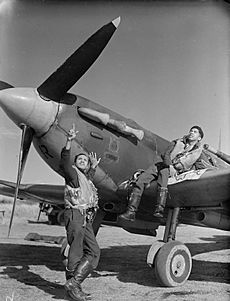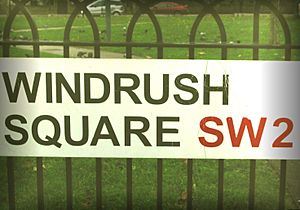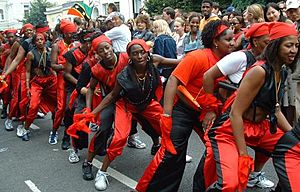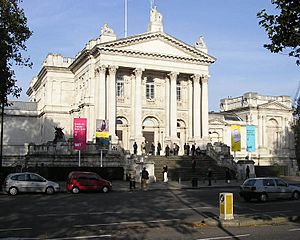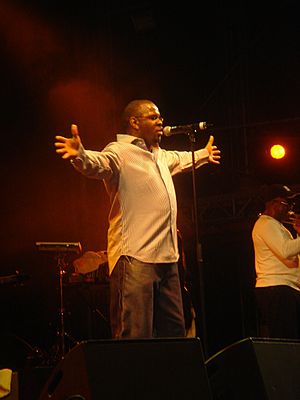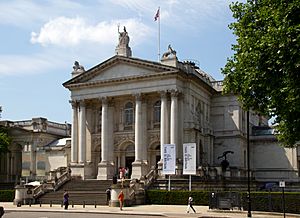British African-Caribbean people facts for kids
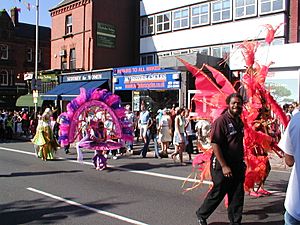
The Leicester Caribbean Carnival
|
|
| Regions with significant populations | |
|---|---|
| Greater London · West Midlands · Birmingham · Manchester · Huddersfield · Leeds · Liverpool · Cardiff · Bradford · Milton Keynes · Bristol · Northampton · Nottingham · Leicester · Luton · Sheffield · Reading · Slough · Gloucester · Glasgow | |
| Languages | |
| British English · Caribbean English | |
| Religion | |
| Predominantly Christianity Muslim and Rastafarian minority |
|
| Related ethnic groups | |
| African diaspora · African-Caribbean · Bahamian British · British Jamaicans · Guyanese British · Barbadian British · Grenadian British · Montserratian British · Trinidadian and Tobagonian British · Antiguan British |
British African-Caribbean people are a cultural group in the United Kingdom. They are British citizens or residents of Caribbean descent, whose ancestry originates primarily from Africa, though some self-identified Afro-Caribbean people are multi-racial. The most common and traditional use of the term African-Caribbean community is in reference to groups of residents continuing aspects of Caribbean culture, customs and traditions in the UK.
The earliest generations of Afro-Caribbean people to migrate to Britain traced their ancestry to a wide range of ethnic groups; from disparate African peoples taken from West Africa as slaves to the colonial Caribbean, in addition to smaller amounts of ancestry from various indigenous Caribbean tribes, and from settlers of European and Asian ethnic groups.
Arriving in small numbers to reside in port cities in England and Wales since the mid-18th century, the most significant wave of migration came after World War II, coinciding with the decolonisation era and the dissolution of the British Empire. Known as the Windrush generation, they had arrived as citizens of United Kingdom and Colonies (CUKCs) in the 1950s and 1960s owing to birth in the former British colonies of the Caribbean. Although those who settled in the UK prior to 1973 were granted either right of abode or indefinite leave to remain by the Immigration Act 1971, a series of governmental policies had caused some to be erroneously labelled as unlawfully residing in the UK in the 2000s and 2010s, which subsequently became known as the Windrush scandal. The population has a diverse background, with origins in Jamaica, Trinidad and Tobago, Saint Kitts and Nevis, Barbados, Grenada, Antigua and Barbuda, Saint Lucia, Dominica, Montserrat, Anguilla, Saint Vincent and the Grenadines, Guyana, and Belize.
In the 21st century, African-Caribbean communities are present throughout the United Kingdom's major cities, and the surviving members of this generation, sometimes called the Windrush Britons, and their descendents, constitute the multi-ethnic cultural group residing in the country. As there isn't a specific UK census category which comprehensively covers the community, population numbers remain somewhat ambiguous. 'Black Caribbean' (under a 'Black British' heading), and 'Mixed: White and Black Caribbean' (under a 'Mixed' heading) denote full or partial descent, and recorded 594,825 and 426,715 persons, respectively, at the 2011 United Kingdom census. 'White: White Caribbean', 'Mixed: Caribbean Asian' and 'Mixed: White Caribbean' are census categories which were also utilised. In this regard, and illustrating complexities within African Caribbean peoplehood, there are notable examples of those with a parent or grandparent of African-Caribbean ancestry identifying with, or being perceived as, white people in the United Kingdom.
Terminology
A glossary published in the Journal of Epidemiology and Community Health with the intention of stimulating debate about the development of better and more internationally applicable terms to describe ethnicity and race, suggests a definition of Afro-Caribbean/African Caribbean as, "A person of African ancestral origins whose family settled in the Caribbean before emigrating and who self identifies, or is identified, as Afro-Caribbean (in terms of racial classifications, this population approximates to the group known as Negroid or similar terms)". A survey of the use of terms to describe people of African descent in medical research notes that: "The term African Caribbean/Afro-Caribbean when used in Europe and North America usually refers to people with African ancestral origins who migrated via the Caribbean islands". It suggests that use of the term in the UK is inconsistent, with some researchers using it to describe people of Black and of Caribbean descent, whereas others use it to refer to those of either West African or Caribbean background.
The British Sociological Association's guidelines on ethnicity and race state that "African-Caribbean has replaced the term Afro-Caribbean to refer to Caribbean peoples and those of Caribbean origin who are of African descent. There is now a view that the term should not be hyphenated and that indeed, the differences between such groups mean the people of African and Caribbean origins should be referred to separately". The Guardian and Observer style guide prescribes the use of "African-Caribbean" for use in the two newspapers, specifically noting "not Afro-Caribbean".
Sociologist Peter J. Aspinall argues that the term 'Black' has been reclaimed by people of African and Caribbean origin in the UK, noting that in a 1992 health survey, 17 per cent of 722 African–Caribbeans surveyed, including 36 percent of those aged 16 to 29, described themselves as 'Black British'. This, he suggests, "appears to be a pragmatic and spontaneous (rather than politically-led) response to the wish to describe an allegiance to a 'British' identity and the diminishing importance of ties with a homeland in the Caribbean".
History
Early pioneers
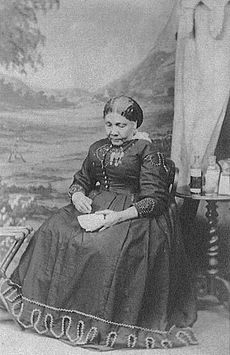
From the 16th century to the 19th century, enslaved Africans were shipped by European slave traders to British colonies in the Caribbean and British North America, as well as French, Dutch, Danish, Spanish, and Portuguese colonies. New World slavery was originally focused on the extraction of gold and other precious raw materials. Africans were then later set to work on the vast cotton, tobacco and sugar plantations in the Americas for the economic benefit of these colonial powers and their plantocracy. One impact of the American Revolution was the differing historical development of African-American and African-Caribbean people. Whereas the American colonies had established slavery by positive laws, slavery did not exist under English common law and was thus prohibited in England.
The much lauded British Afro-Caribbean Ignatius Sancho was among the leading British abolitionists in the 18th century, and in 1783 an abolitionist movement spread throughout Britain to end slavery throughout the British Empire, with the poet William Cowper writing in 1785: "We have no slaves at home – Then why abroad? Slaves cannot breathe in England; if their lungs receive our air, that moment they are free. They touch our country, and their shackles fall. That's noble, and bespeaks a nation proud. And jealous of the blessing. Spread it then, And let it circulate through every vein." There are records of small communities in the ports of Cardiff, Liverpool, London and South Shields dating back to the mid-18th century. These communities were formed by freed slaves following the abolition of slavery. Typical occupations of the early migrants were footmen or coachmen.
19th century
Prominent African-Caribbean people in Britain during the 19th century include:
- William Davidson (1781–1820), Cato Street Conspirator
- Rev. George Cousens, a Jamaican who became minister of Cradley Heath Baptist Church in 1837
- Mary Seacole (1805–1881), a nurse in the Crimean War.
- Walter Tull, footballer and soldier,
- Andrew Watson, footballer.
- Robert Wedderburn (1762-1835/6?), Spencean revolutionary
- Nathaniel Wells, landowner and yeomanry officer.
Early 20th century
The growing Caribbean presence in the British military led to approximately 15,000 migrants arriving in the north-west of England around the time of World War I to work in munitions factories.
The Jamaican poet and communist activist, Claude McKay came to England following the First World War and became the first Black British journalist, writing for the Workers' Dreadnought.
World War II
In February 1941, 345 West Indian workers were brought to work in and around Liverpool. They were generally better skilled than the local Black British. There was some tension between them and West Africans who had settled in the area.
The "Windrush generation"
Since World War II, many African-Caribbean people migrated to North America and Europe, especially to the United States, Canada, the UK, France, and the Netherlands. As a result of the losses during the war, the British government began to encourage mass immigration from the countries of the British Empire and Commonwealth to fill shortages in the labour market. The British Nationality Act 1948 gave British citizenship to all people living in Commonwealth countries, and full rights of entry and settlement in Britain. Many West Indians were attracted by better prospects in what was often referred to as the mother country.
The ship MV Empire Windrush brought a group of 492 migrants to Tilbury, near London, on 22 June 1948. The Windrush was en route from Australia to England via the Atlantic, docking in Kingston, Jamaica in order to pick up servicemen who were on leave. An advertisement had appeared in a Jamaican newspaper offering cheap transport on the ship for anybody who wanted to come and work in the UK. Many former servicemen took this opportunity to return to Britain with the hopes of rejoining the RAF, while others decided to make the journey just to see what England was like. The arrivals were temporarily housed in the Clapham South deep shelter in southwest London, about two miles away from Coldharbour Lane in Brixton. Many only intended to stay in Britain for a few years, and although a number returned to the Caribbean, the majority remained to settle permanently. The arrival of the passengers has become an important landmark in the history of modern Britain, and the image of West Indians filing off the ship's gangplank has come to symbolise the beginning of modern British multicultural society.
There was plenty of work in post-war Britain and industries such as British Rail, the National Health Service and public transport recruited almost exclusively from Jamaica and Barbados. Though Afro-Caribbean people were encouraged to journey to Britain through immigration campaigns created by successive British governments, many new arrivals were to endure prejudice, intolerance and extreme racism from sectors of White British society. This experience was to mark African-Caribbean people's relations with the wider community over a long period. Early African-Caribbean immigrants found private employment and housing denied to them on the basis of race. Trade unions would often not help African-Caribbean workers and some pubs, clubs, dance halls and churches would bar black people from entering. Housing was in short supply following the wartime bombing, and the shortage led to some of the first clashes with the established white community. Clashes continued and worsened into the 1950s, and riots erupted in cities including London, Birmingham and Nottingham. In 1958, attacks in the London area of Notting Hill by white youths marred relations with West Indian residents, leading to the creation of the annual Notting Hill Carnival, which was initiated in 1959 as a positive response by the Caribbean community. Some of the racism and intolerance was stoked by explicitly fascist or anti-immigration movements including Oswald Mosley's Union Movement, the League of Empire Loyalists, the White Defence League, the National Labour Party and others. Influenced by this kind of propaganda, gangs of Teddy Boys would often attack blacks in London. Historian Winston James argues that the experience of racism in Britain was a major factor in the development of a shared Caribbean identity amongst immigrants from a range of different island and class backgrounds. The shared experience of employment by organisations such as London Transport and the National Health Service also played a role in the building of a British African-Caribbean identity.
Demographer Ceri Peach estimates that the number of people in Britain born in the West Indies grew from 15,000 in 1951 to 172,000 in 1961. In 1962, Britain passed the Commonwealth Immigrants Act restricting the entry of immigrants, and by 1972 only holders of work permits, or people with parents or grandparents born in the UK, could gain entry – effectively stemming most Caribbean immigration. Despite the restrictive measures, an entire generation of Britons with African-Caribbean heritage now existed, contributing to British society in virtually every field.
Recession and turbulence, 1970s and 1980s
The 1970s and 1980s were decades of comparative turbulence in wider British society; industrial disputes preceded a period of deep recession and widespread unemployment which seriously affected the economically less prosperous African-Caribbean community. During the decades of the 1970s and 1980s, unemployment among the children of Caribbean migrants ran at three to four times that of white school leavers. By 1982 the number of all people out of work in Britain had risen above three million for the first time since the 1930s. Societal racism, discrimination, poverty, powerlessness and oppressive policing sparked a series of riots in areas with substantial African-Caribbean populations. These "uprisings" (as they were described by some in the community) took place in St Pauls in 1980, Brixton, Toxteth and Moss Side in 1981, St Pauls again in 1982, Notting Hill Gate in 1982, Toxteth in 1982, and Handsworth, Brixton and Tottenham in 1985.
The riots had a profoundly unsettling effect on local residents, and led the then Home Secretary William Whitelaw to commission the Scarman report to address the root causes of the disturbances. The report identified both "racial discrimination" and a "racial disadvantage" in Britain, concluding that urgent action was needed to prevent these issues becoming an "endemic, ineradicable disease threatening the very survival of our society". The era saw an increase in attacks on Black people by white people. The Joint Campaign Against Racism committee reported that there had been more than 20,000 attacks on non-indigenous Britons including Britons of Asian origin during 1985.
Recent history
In 2009, 1.2% of British children under 16 were Black Caribbean and 1.1% were mixed white and black Caribbean. Among those children who were living with at least one Caribbean parent, only one in five were living with two Caribbean parents.
Demographics
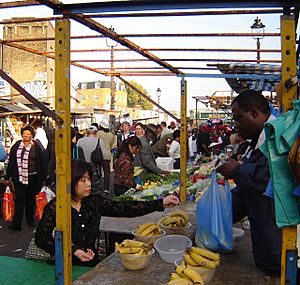
In the 2011 Census of England and Wales, 594,825 individuals specified their ethnicity as "Caribbean" under the "Black/African/Caribbean/Black British" heading, and 426,715 as "White and Black Caribbean" under the "Mixed/multiple ethnic group" heading. In Scotland, 3,430 people classified themselves as "Caribbean, Caribbean Scottish or Caribbean British" and 730 as "Other Caribbean or Black" under the broader "Caribbean or Black" heading. In Northern Ireland, 372 people specified their ethnicity as "Caribbean". The published results for the "Mixed" category are not broken down into sub-categories for Scotland and Northern Ireland as they are for England and Wales.
In the UK Census of 2001, 565,876 people classified themselves in the category 'Black Caribbean', amounting to around 1 per cent of the total population. Of the "minority ethnic" population, which amounted to 7.9 per cent of the total UK population, Black Caribbean people accounted for 12.2 per cent. In addition, 14.6 per cent of the minority ethnic population (equivalent to 1.2 per cent of the total population) identified as mixed race, of whom around one third stated that they were of mixed Black Caribbean and White descent.
Birthplace
The Census also records respondents' countries of birth and the 2001 Census recorded 146,401 people born in Jamaica, 21,601 from Barbados, 21,283 from Trinidad and Tobago, 20,872 from Guyana, 9,783 from Grenada, 8,265 from Saint Lucia, 7,983 from Montserrat, 7,091 from Saint Vincent and the Grenadines, 6,739 from Dominica, 6,519 from Saint Kitts and Nevis, 3,891 from Antigua and Barbuda and 498 from Anguilla.
Detailed country-of-birth data from the 2011 Census is published separately for England and Wales, Scotland and Northern Ireland. In England and Wales, 160,095 residents reported their country of birth as Jamaica, 22,872 Trinidad and Tobago, 18,672 Barbados, 9,274 Grenada, 9,096 St Lucia, 7,390 St Vincent and the Grenadines, 7,270 Montserrat, 6,359 Dominica, 5,629 St Kitts and Nevis, 3,697 Antigua and Barbuda, 2,355 Cuba, 1,812 The Bahamas and 1,303 Dominican Republic. 8,301 people reported being born elsewhere in the Caribbean, bringing the total Caribbean-born population of England and Wales to 264,125. Of this number, 262,092 were resident in England and 2,033 in Wales. In Scotland, 2,054 Caribbean-born residents were recorded, and in Northern Ireland 314. Guyana is categorised as part of South America in the Census results, which show that 21,417 residents of England and Wales, 350 of Scotland and 56 of Northern Ireland were born in Guyana. Belize is categorised as part of Central America. 1,252 people born in Belize were recorded living in England and Wales, 79 in Scotland and 22 in Northern Ireland.
Based on a variety of official sources and extrapolating from figures for England alone, Ceri Peach estimates that the number of people in Britain born in the West Indies grew from 15,000 in 1951, to 172,000 in 1961 and 304,000 in 1971, and then fell slightly to 295,000 in 1981. He estimates the population of West Indian ethnicity in 1981 to be between 500,000 and 550,000.
Education
Throughout the 1950s and 1960s, a disproportionate number of Caribbean migrant children were classified as "educationally subnormal" and placed in special schools and units. By the end of the 1980s, the chances of white school leavers finding employment were four times better than those of black pupils. In 2000–01, black pupils were three times more likely than white pupils and ten times more likely than Indian pupils to be officially excluded from school for disciplinary reasons.
In 2004, 23.2 per cent of Black Caribbean pupils in England achieved five or more GCSEs or equivalent at grades A* to C including English and mathematics, compared with 41.6 per cent of White British pupils and 40.9 per cent of all pupils regardless of ethnicity. In 2013, the equivalent figures were 53.3 per cent for Black Caribbean pupils, 60.5 per cent for White British pupils and 60.6 per cent overall. Black Caribbean pupils from low income backgrounds tend to academically perform better than White British pupils from low income families. Amongst pupils eligible for free school meals (used as a measure of low family incomes), Black Caribbean pupils outperformed White British pupils by 36.9 to 27.9 per cent for boys and 47.7 to 36.8 per cent for girls in 2013. A report published by the Department for Education in 2015 notes that "Black Caribbean and Mixed White & Black Caribbean students have...shown very strong improvement, from being half as likely [as] White British students to achieve the benchmarks of educational success in the early 2000s to near parity in 2013, although stubborn gaps do remain".
Black Caribbean pupils have a higher university entry rate than White British students.
Socio-economic status
A person’s socio-economic status is based on the type of work they do, or what they used to do if they are retired. There are 12 socio-economic classifications. According to official UK Government figures (updated in 2020), 40.7% of Black Caribbeans are in the top 3 socio-economic groups (higher managerial, professional and intermediate). This is the fifth highest combined percentage out of all the 18 ethnicities featured.
Population distribution
The greatest concentration of 'Black Caribbean' people is found in London, where 344,597 residents classified themselves as Black Caribbean in the 2011 Census, accounting for 4.2 per cent of the city's population. Other significant concentrations were (not in order) Birmingham, Manchester, Bradford, Nottingham, Coventry, Luton, Watford, Slough, Leicester, Bristol, Gloucester, Leeds, Huddersfield, Sheffield, Liverpool and Cardiff. In these cities, the community is traditionally associated with a particular area, such as Brixton, Harlesden, Stonebridge, Hackney, Lewisham, Tottenham and Peckham in London, West Bowling and Heaton in Bradford, Chapeltown in Leeds, St. Pauls in Bristol, Handsworth and Aston in Birmingham, Moss Side in Manchester, St Ann's in Nottingham, Pitsmoor in Sheffield and Toxteth in Liverpool. According to the 2011 UK Census Birmingham was home to the largest Black Caribbean population, followed by Croydon, Lewisham, Lambeth, Brent and Hackney.
| Region | British Caribbean population | Percentage of region's population | Percentage of British Caribbean population |
|---|---|---|---|
| England | 591,016 | 1.1% | 98.7% |
| London | 344,597 | 4.2% | 57.6% |
| West Midlands | 86,794 | 1.5% | 14.5% |
| South East | 34,225 | 0.4% | 5.7% |
| East | 33,614 | 0.6% | 5.6% |
| East Midlands | 28,913 | 0.6% | 4.8% |
| Yorkshire and The Humber | 23,420 | 0.4% | 3.9% |
| North West | 23,131 | 0.3% | 3.9% |
| South West | 15,129 | 0.3% | 2.5% |
| North East | 1,193 | 0.05% | 0.2% |
| Wales | 3,809 | 0.1% | 0.6% |
| Scotland | 3,430 | 0.1% | 0.6% |
| Northern Ireland | 372 | 0.02% | 0.06% |
| United Kingdom | 598,627 | 0.9% | 100% |
Religion
The vast majority of African-Caribbeans in the United Kingdom follow Christianity, but there are around 40,000 African-Caribbean Muslims, 30,000 of those reside in London. Some of them are born to Muslim families, while others converted to Islam in various circumstances including marriage.
The community
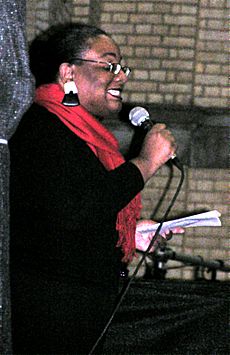
In many parts of Britain, African-Caribbean people have been recognised as being part of a distinct community. In the 1950s and 1960s community centres and associations sprung up in some British towns and cities with an aim to serve African-Caribbean populations. One such example was the African Caribbean Self Help Organisation (ACSHO), formed in 1994 in the district of Handsworth in Birmingham. These centres have often addressed issues that rise within the community, including perceived problems of police harassment and concerns about the housing of Black people, which was viewed as discriminatory during the early decades of mass immigration. One such community centre was the Gloucestershire West Indian Association, which was formed in 1962. The formation of this group was in response to a number of issues that arose within the community at this time. These included perceived problems around police harassment and concerns about the housing of Black people on certain council estates in the city, which was viewed as discrimination and segregation. The centres also allowed African-Caribbean peoples to socialise without risking the potential racial discrimination and aggression of "unfriendly pubs". Many of these associations appointed a Community Relations Officer whose role was to liaise between the community and wider British society including the establishment. Other responsibilities included arranging social events, such as festivals, carnivals and coach trips, which helped bring the communities together. Large centres presently operating include the Leeds West Indian centre and the Manchester West Indian centre. Typical of present-day centres is the Afro Caribbean Millennium Centre in Birmingham, which was established with National Lottery funding to support principally Caribbean people in areas such as employment, housing, education, immigration, and cultural issues.
Politics
Although the community does not face any official or informal restrictions on political participation, Britons of Caribbean origin are nonetheless under-represented in local and national politics. However, there have been some successes with Diane Abbott being the first black person elected to Parliament under the Labour Party and Linda C. Douglas being the first black person to be part of the Labour Party National Executive Committee representing the later expelled Militant tendency. British African-West Indians have long asserted that they encounter discriminatory barriers to most middle- and higher-status occupations, as well as discrimination in hiring practices at all levels of employment. There is also considerable evidence that African-Caribbean people experience differential treatment at the hands of public officials, the British courts and penal system, and the police. Studies have proposed that the isolation of certain regional urban areas by financial institutions such as insurance brokers disproportionately affects the community to its detriment.
Education
Britain's school system, despite efforts to address issues of discrimination, has often been accused of racism through undermining the self-confidence of all Black children and maligning the culture of their parents. Throughout the 1950s and 1960s, a disproportionate number of Caribbean migrant children were classified as "educationally subnormal" and placed in special schools and units. By the end of the 1980s, the chances of white school leavers finding employment were four times better than those of Black pupils. In 2000–01, Black pupils were three times more likely than white pupils and ten times more likely than Indian pupils to be officially excluded from school for disciplinary reasons. These chronic problems have contributed to the group being disproportionately at the lower end of the socio-economic spectrum and thus have continued to face challenging social problems into the 21st century.
In 2007, 49% of Afro Caribbean pupils achieved five or more GCSEs at grades A* to C. 56% of girls achieved five or more GCSEs at A*-C, with 42% of boys doing the same.
African-Caribbean culture in the United Kingdom
Carnivals
African-Caribbean communities organise and participate in Caribbean Carnivals (Caribbean style carnivals) throughout the UK. The best known of these is the annual Notting Hill Carnival, attracting up to 1.5 million people from Britain and around the world, making it the largest street festival in Europe. The carnival began in 1964 as a small procession of Trinidadians in memory of festivals in their home country, and today is regarded as a significant event in British culture. In 2006 the carnival was voted onto the list of icons of England.
Leeds West Indian Carnival is Europe's oldest West Indian carnival and now attracts around 130,000 people.
Other carnivals include the Leicester Caribbean Carnival and the Birmingham International Carnival.
Food
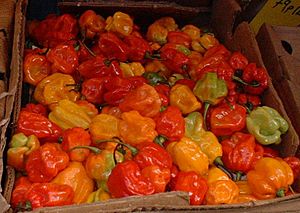
The earliest Caribbean immigrants to post-war Britain found differences in diet and availability of food an uncomfortable challenge. In later years, as the community developed and food imports became more accessible to all, grocers specialising in Caribbean produce opened in British high streets. Caribbean restaurants can now also be found in most areas of Britain where West Indian communities reside, serving traditional Caribbean dishes such as curried goat, fried dumplings, ackee and salt fish (the national dish of Jamaica), Pelau (the national dish of Trinidad and Tobago), (Cou-Cou and Flying Fish the national dish of Barbados), Pudding and Souse, as well as Fish Cakes from Barbados. The spices known as "jerk" and the traditional Sunday West Indian meal of rice and peas.
The best-known Caribbean food brands in the UK are Jamaican Sun, Tropical Sun, Dunn's River and Grace. In March 2007, Grace foods bought ENCO Products, owners of the Dunn's River Brand, as well as Nurishment, and the Encona Sauce Range. Tropical Sun products have been widely available in the UK for over two decades and there is a sister brand, Jamaica Sun, with products sourced exclusively from Jamaica. The most popular brands can now often be found in the large supermarkets; although the full range continues to be offered only by the local ethnic stores, the interest by the mainstream supermarkets reflects the wider population's interest in ethnic and more lately Afro-Caribbean foods.
Religion
The influx of African-Caribbean people to the United Kingdom was accompanied by religious practices more common to the North American continent. In Britain, many African-Caribbean people continued to practise Non-conformist Protestant denominations with an Evangelical influence such as Pentecostalism and Seventh Day Baptism. African-Caribbean people have supported new churches in many areas of the country, which have grown to act as social centres for the community. Mike Phillips, writing for the UK national archive project, described the influences of the new churches thus; "[they] gave the entire Caribbean community a sense of stability. At a time when migrants were under severe psychological pressure and distrusted the official services, or were misunderstood when they went to them, the Black church groups offered invaluable advice and comfort." In 2005, The Economist magazine discussed the growth of evangelical churches in London and Birmingham; "Another reason is that Britain's most prominent Afro-Caribbean institutions – the Black evangelical churches – are dominated by the urban poor. That has to do with the way the Caribbean was missionised: the hotter brand of Christianity gained most converts among the dispossessed, who then re-exported it to Britain." The manner of worship in some of these churches is more akin to that of African-American practices than to traditional English Catholic or Anglican liturgy. Gospel music also came to play a part in British cultural life. African-Caribbean people played a central role establishing British gospel choirs, most notably the London Community Gospel Choir.
Some British African-Caribbean people continue to practise other religious beliefs such as the Rastafari movement, which developed in Jamaica.
There are around 40,000 African-Caribbean Muslims in the United Kingdom, 30,000 of those reside in London. Muslims of African-Caribbean origins are found in British major cities and town. Some of them, are born to Muslim families, while others converted to Islam in various circumstances including marriage.
Language and dialect
English is the official language of the former British West Indies, therefore African-Caribbean immigrants had few communication difficulties upon arrival in Britain compared to immigrants from other regions. Nevertheless, indigenous Britons were generally unused to the distinct Caribbean dialects, creoles and patois (patwah) spoken by many African-Caribbean immigrants and their descendants, which would be particularly problematic in the field of education. In a study by language and education specialist Viv Edwards, The West Indian language issue in British schools, language – the Creole spoken by the students – was singled out as an important factor disadvantaging Caribbean children in British schools. The study cites negative attitudes of teachers towards any non-standard variety noting that;
"The teacher who does not or is not prepared to recognise the problems of the Creole-speaking child in a British English situation can only conclude that he is stupid when he gives either an inappropriate response or no response at all. The stereotyping process leads features of Creole to be stigmatised and to develop connotations of, amongst other things, low academic ability."
As integration continued, African-West Indians born in Britain instinctively adopted hybrid dialects combining Caribbean and local British dialects. These dialects and accents gradually entered mainstream British vernacular, and shades of Caribbean dialects can be heard among Britons regardless of cultural origin. A Lancaster University study identified an emergence in certain areas of Britain of a distinctive accent which borrows heavily from Jamaican creole, lifting some words unchanged. This phenomenon, disparagingly named "Jafaican" meaning "fake Jamaican", was famously parodied by comedian Sacha Baron Cohen through his character Ali G.
Theatre, television and mainstream cinema
The 1970s saw the emergence of independent filmmakers such as Trinidadian-born Horace Ové, the director of Pressure, among others. London's Talawa Theatre Company was founded in the 1985 by Jamaican-born Yvonne Brewster, their first production being based on C. L. R. James's historical account of the Haitian Revolution, The Black Jacobins. Since the 1980s, the Blue Mountain Theatre's productions have offered a more earthy style of populist comedy, often bringing over Jamaican artists such as Oliver Samuels.
While Guyanese actor Robert Adams became the first African-Caribbean dramatic actor to appear on British television on 11 May 1938 (in a production of Eugene O'Neill's play The Emperor Jones), African-Caribbean entertainers were first widely popularised on British television broadcasts with the postwar resumption of BBC television in 1946 (pre-war black entertainers on the BBC - the first in the world - had primarily been African-American stars). The profile of African-Caribbean actors on television, such as Lennie James, Judith Jacob and Diane Parish, has widened substantially since 1970s shows such as Love Thy Neighbour (Rudolph Walker) and Rising Damp (Don Warrington) when their role was often to act simply as either the butt of, or foil to, racist jokes by white characters. The most influential programme in moving away from this formula was the 1989–94 Channel Four barbershop sitcom Desmond's, starring Norman Beaton and Carmen Munroe.
One of the biggest African-Caribbean names in comedy is Lenny Henry, who began his career as a stand-up comedian but whose television sketch shows, where he often caricatured Caribbean émigrés, made him popular enough to headline numerous primetime comedy shows from, for instance, Lenny Henry in 1984 to The Lenny Henry Show in 2004. The highest professional achievement by a British African-Caribbean actor to date (2006) was Marianne Jean-Baptiste's 1996 nominations for an Academy Award (Oscar), Golden Globe and British Academy Award (bafta) for her feature-film debut role in Secrets & Lies.
Literature
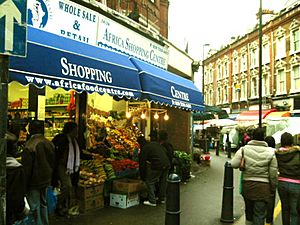
Jamaican poet James Berry was one of the first Caribbean writers to come to Britain after the 1948 British Nationality Act. He was followed by writers including Barbadians George Lamming and Edward Kamau Brathwaite, Trinidadians Samuel Selvon and C. L. R. James, Jamaican Andrew Salkey and the Guyanese writer Wilson Harris. These writers viewed London as the centre of the English literary scene, and took advantage of the BBC Radio show Caribbean Voices to gain attention and be published. By relocating to Britain, these writers also gave Caribbean literature an international readership for the first time and established Caribbean writing as an important perspective within English literature.
Some Caribbean writers also began writing about the hardships faced by settlers in post-war Britain. Lamming addressed these issues in his 1954 novel The Emigrants, which traced the journey of migrants from Barbados as they struggled to integrate into British life. Selvon's The Lonely Londoners (1956) details the life of West Indians in post-World War II London. Writing much later, Ferdinand Dennis both in his journalism and novels, such as The Sleepless Summer (1989) and The Last Blues Dance (1996), deals with "an older generation of Caribbean immigrants, whose narratives, stoical and unpolemical, rarely find expression".
By the mid-1980s, a more radical wave of writers and poets were addressing the African-Caribbean experience in Britain, promoted by a group of new publishing houses such as Akira, Karia, Dangaroo, and Karnak House, alongside the older established New Beacon Books and Bogle-L'Ouverture Publications, both founded in the 1960s, and the International Book Fair of Radical Black and Third World Books (1982–1995).
In 1984, the poet Fred D'Aguiar (born in London to Guyanese parents) won the T. S. Eliot Prize, and in 1994 won the Whitbread First Novel Award for The Longest Memory. Linton Kwesi Johnson's rhyming and socio-political commentary over dub beats – including "Dread Beat An' Blood" – made him the unofficial poet laureate of the British African-Caribbean community. Another dub poet, Benjamin Zephaniah, born in Birmingham to Jamaican parents, overcame a spell in prison to become a well-known writer and public figure. In 2003 he declined an OBE, stating that it reminded him of "thousands of years of brutality".
African-Caribbean British writers have achieved recent literary acclaim. In 2004, Andrea Levy's novel Small Island was the winner of the 2004 Orange Prize for Fiction, one of Britain's highest literary honours. Levy, born in London to Jamaican parents, is the author of four novels, each exploring the problems faced by Black British-born children of Jamaican emigrants. In 2006 Zadie Smith won the Orange Prize for On Beauty. Smith's acclaimed first novel, White Teeth, was a portrait of contemporary multicultural London, drawing from her own upbringing with an English father and a Jamaican mother.
Visual arts
One of the most influential African-Caribbean people in the British art world has been Prof. Eddie Chambers. Chambers, along with Donald Rodney, Marlene Smith and curator, artist, critic and academic Keith Piper, founded the BLK Art Group in 1982, when they were initially based in the West Midlands. According to Chambers, significant artists such as the Guyanese-born painters Aubrey Williams and Frank Bowling and the Jamaican sculptor Ronald Moody initially found that, despite achieving worldwide renown, it was difficult to find acceptance in the highest echelons of the art establishment. Chambers worked with Donald Rodney and Sonia Boyce, both of whose work is represented in the permanent collections of the London's Tate Britain museum. In 1986 the Hayward Gallery presented the exhibition The Other Story, which provided a survey of African-Caribbean, African and Asian artists working in the UK.
Other African-Caribbean artists of note include Faisal Abdu'allah of Jamaican heritage, Guyanese-born Ingrid Pollard, British-based Jamaican painter Eugene Palmer, the sculptor George "Fowokan" Kelly, and Tam Joseph, whose 1983 work Spirit of Carnival was a vivid depiction of the Notting Hill Carnival. The movement was also part of the impetus that led to the founding of the Association of Black Photographers by Mark Sealy and others. In 1999 the filmmaker Steve McQueen (not to be confused with the Hollywood filmstar) won Britain's most prestigious art prize, the Turner Prize, for his video Deadpan. The artist and producer Pogus Caesar was commissioned by Artangel to direct a film based on McQueen's work. Forward Ever - Backward Never was premiered at the Lumiere in London in 2002. Caesar has also established the OOM Gallery Archives, based in Birmingham, which has in excess of 14,000 images including photographs of contemporary Black British culture.
Academia
There are a number of African-Caribbean academics who are especially prominent in the arts and humanities. Professor Paul Gilroy, of Guyanese/English heritage, is one of Britain's leading academics, having taught sociology at Harvard as well as Goldsmiths College and the London School of Economics. The Jamaican-born cultural theorist Professor Stuart Hall has also been a highly influential British intellectual since the 1960s. Dr. Robert Beckford has presented several national television and radio documentaries exploring African-Caribbean history, culture and religion.
Other prominent academics include Guyanese born Professor Gus John, who has been active in education, schooling and political radicalism in Britain’s inner cities such as Manchester, Birmingham and London since the 1960s. He was involved in the organising the "Black people's day of action", a response to the 1981 New Cross Fire. In 1989 he was appointed Director of Education in Hackney and was the first black person to hold such a position. He has also worked as an education consultant in Europe, the Caribbean and Africa. John was the co-ordinator of the Black Parents Movement in Manchester, founded the Education for Liberation book service and helped to organise the International Book Fair of Radical Black and Third World Books in Manchester, London and Bradford. He has worked in a number of University settings, including a visiting Faculty Professor of Education at the University of Strathclyde in Glasgow and is currently an associate professor of the Institute of Education at the University of London. Dr "William" Lez Henry works with young people, particularly black boys. He is the founder of Black Liberation Afrikan Knowledge (BLK Friday) a platform for people to give presentations to the community. In 2005, he received an Excellence In Education Award at the Challenging The Genius: Excellent Education for Children: “Our Future is Not a dream”, Conference in Chicago, USA. He is one of the founding members of the National Independent Education Coalition (NIEC). Henry previously hosted a fortnightly talk show on popular London pirate radio station Galaxy 102.5FM (formerly 99.5 FM) or http://www.galaxyafiwe.com/ and who is also a former lecturer of Goldsmiths College. Prof. Harry Goldbourne is a former member of the radical group the Black Unity and Freedom Party who went on to teach at the University of the South Bank.
Although there are hundreds of African-Caribbean teachers in the UK, it has been suggested that their under-representation in inner-city schools is a major factor in the failure, particularly of secondary-level schools, to achieve a satisfactory average of achievement for the community's children (see Bernard Coard and the Swann Report of 1985). Though research by the Longitudinal Survey of Young People in England in 2011 showed that 66 per cent of those from native African backgrounds went on to university, compared to an average of 59 per cent of British Asian (Indian, Pakistani and Bangladeshi) students, which therefore suggests that as an average, more people from Black African backgrounds are now progressing to university than those of a South Asian background.
Music
The period of large-scale immigration brought many new musical styles to the United Kingdom. These styles gained popularity amongst Britons of all cultural origins, and aided Caribbean music in gaining international recognition. The earliest of these exponents was the calypso artist Lord Kitchener, who arrived in Britain on the Windrush in 1948 accompanied by fellow musician Lord Beginner. Already a star in his native Trinidad, Lord Kitchener got an immediate booking at the only West Indian club in London. Six months later, he was appearing in three clubs nightly, and his popularity extended beyond the West Indian and African nightclub audiences, to include music hall and variety show audiences. Kitchener's recording "London is the place for me" exemplified the experience of the Windrush generation. Other calypso musicians began to collaborate with African Kwela musicians and British jazz players in London clubs.
Jamaican music styles reached Britain in the 1960s, becoming the staple music for young British African-Caribbean people. Tours by ska artists such as Prince Buster and the Skatalites fed the growing British-Caribbean music scene, and the success of Jamaican artists Millie Small, Desmond Dekker and Bob and Marcia propelled Caribbean music and people into mainstream cultural life. British African-Caribbean people followed the changing styles of Jamaican music and began to produce homegrown music appealing to both Black and White communities. In 1968, The Cats released a cover of Swan Lake, which became the first top fifty hit by a British reggae group and the following year the British African-Caribbean ska band Symarip recorded "Skinhead Moonstomp" - a cover of the Derrick Morgan song Moon Hop - which had a huge effect on the British ska scene. The ska sound and rude boy imagery inspired a generation of white working-class youths (especially mods and skinheads), and later helped spawn Britain's multi-cultural 2 Tone movement in the late 1970s.
As Jamaican ska gave way to the slower styles of rocksteady and the more politicised reggae, British African-Caribbean people followed suit. Sound systems to rival those in Jamaica sprung up throughout communities, and "Blues parties" - parties in private houses, where one paid at the door - became an institution. The arrival of Bob Marley to London in 1971 helped spawn a Black British music industry based on reggae. His association with the Rastafarian movement influenced waves of young people, reared in Britain, to discover their Caribbean roots. British Barbadian Dennis Bovell became Britain's prominent reggae band leader and producer, working with many international reggae stars, and introducing a reggae flavour to the British pop charts with non-reggae acts such as Dexys Midnight Runners and Bananarama. Bovell also worked extensively with London-based dub poet Linton Kwesi Johnson.
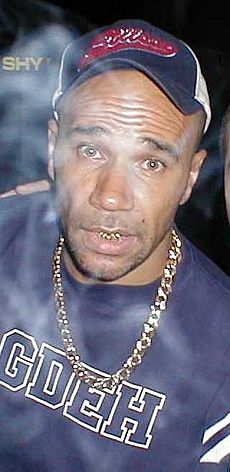
British music with reggae roots prospered in the 1980s and early 1990s. British African-Caribbean artists Musical Youth, Aswad, Maxi Priest and Eddy Grant had major commercial successes, and the multicultural band UB40 helped promote reggae to an international audience. Birmingham-based Steel Pulse became one of the world's foremost exponents of roots reggae and accompanying black consciousness, their debut 1978 album Handsworth Revolution becoming a seminal release.
British African-Caribbean music had been generally synonymous with Caribbean styles until the 1990s, although some artists had been drawing on British and American musical forms for several decades. In the 1970s and 1980s, British African-Caribbean artists such as Hot Chocolate and Imagination became leaders of the British disco, soul and R&B scenes. By the mid-1980s British African-Caribbean people were also incorporating American hip hop and House styles, becoming leading figures in Britain's developing dance music culture. This led to an explosion of musical forms. British artists created musical hybrids combining many elements including European techno, Jamaican dancehall, dub, breakbeats and contemporary American R'n'B. These unique blends began to gain international acclaim through the success of Soul II Soul and the multi-racial Massive Attack.
British African-Caribbean people were at the leading edge of the jungle and drum and bass movements of the 1990s. Although the fast-tempo drums and loud intricate bass lines sounded fresh, Caribbean roots could still be detected. Two successful exponents of these new styles were DJs Goldie and Roni Size, both of Jamaican heritage. Later, British African-Caribbean musicians and DJs were at the forefront of the UK garage and Grime scenes.
African-Caribbean People in British sport
British African-Caribbean people are well represented in traditional British sports such as football and rugby, and have also represented the nation at the highest level in sports where Caribbean people typically excel in the home countries such as cricket and athletics. Some British African-Caribbean people have gone on to become international sports stars and top global earners in their chosen sporting field.
Athletics
Britain's first Olympic sprint medals came from Harry Edward, born in Guyana, who won two individual bronze medals at the 1920 games in Antwerp. Many years later, sprinter Linford Christie, born in Saint Andrew Parish, Jamaica, won 23 major championship medals, more than any other British male athlete to date. Christie's career highlight was winning a gold medal in the immensely competitive 100 metres event in the 1992 Barcelona Olympics. Welsh Hurdler Colin Jackson, who went to considerable lengths to explore his Jamaican heritage in a BBC documentary, held the 110 metres hurdles world record for 11 years between 1993 and 2004.
Ethel Scott (1907–84) had a Jamaican father and an English mother was the first black woman to represent Great Britain in an international athletics competition. She was a sprinter active in international competitions for a brief period in the 1930s. In general, Scott's achievements are only thinly documented, and she is largely unknown to the British public and historians of sport. Jamaican-born Tessa Sanderson became the first British African-Caribbean woman to win Olympic gold, receiving the medal for her javelin performance in the 1984 Los Angeles Olympics. Denise Lewis, of Jamaican heritage, won heptathlon gold in the 2000 Sydney Olympics, a games where 13 of Britain's 18 track and field representatives had Afro-Caribbean roots. Four years later in the Athens Olympics, Kelly Holmes, the daughter of a Jamaican-born car mechanic, achieved the rare feat of taking gold in both the 800 and 1500 metres races. In the same games, Britain's men's 4 × 100 metre relay team of Marlon Devonish, Darren Campbell, Mark Lewis-Francis and Jason Gardener, all of African-Caribbean heritage, beat the favoured United States quartet to claim Olympic gold.
Boxing
British boxers of a Caribbean background have played a prominent role in the national boxing scene since the early 1980s. In 1995 Frank Bruno, whose mother was a Pentecostal laypreacher from Jamaica, became Britain's first world heavyweight boxing champion in the 20th century. Bruno's reign was shortly followed by British-born Jamaican Lennox Lewis, who defeated Evander Holyfield and Mike Tyson to become the world's premier heavyweight during the late 1990s. Middleweights Chris Eubank, who spent his early years in Jamaica, and Nigel Benn, of Barbadian descent, both claimed world titles and fought a series of brutal battles in the early 1990s. In the Sydney Olympics of 2000, Audley Harrison (who has Jamaican heritage) became Britain's first heavyweight gold medalist. Other boxing champions from the British African-Caribbean community include the welterweight Lloyd Honeyghan, nicknamed "Ragamuffin Man" by boxing superstar Donald Curry in 1986, in reference to his (in comparison to Curry's extravagance) normal appearance; Honeyghan subsequently spectacularly defeated Curry.
Cricket
Cricket has long been a popular pastime among African-Caribbean people in both the West Indies and the United Kingdom, though this has waned somewhat since its peak during the 1960s-1980s. After the period of widespread immigration, tours of England by the combined West Indian cricket team became cultural celebrations of Caribbean culture in Britain, particularly at cricket grounds such as The Oval in South London. Almost all the great West Indian cricketers became regular features of the domestic county game, including Garfield Sobers, Vivian Richards and Michael Holding. In turn, British cricketers of Caribbean origin also began to make an impact in English cricket. In the 1980s-1990s, players including Gladstone Small (born in Barbados), Devon Malcolm (born in Jamaica) and Phillip DeFreitas (born in Dominica) represented England, making significant contributions to the side. Phillip DeFreitas, Devon Malcolm and Gladstone Small made 44, 40 and 17 test match appearances for England respectively. DeFreitas also played 103 One Day Internationals for England. Malcolm made 10 appearances and Small made 53 appearances in the shorter format. Small and DeFreitas also represented England in the final of the 1987 Cricket World Cup against Australia.
Motorsport
Lewis Hamilton, whose paternal grandparents immigrated from Grenada, achieved the highest honour in Motorsport, winning the FIA Formula One World Championship in 2008, only his second season in the sport, after narrowly finishing second in the championship in his debut season. He won the Championship again in 2014 and 2015.
Football
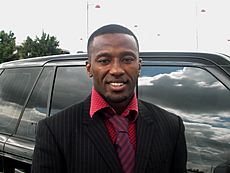
The first West Indian-born footballer to play football at a high level in Britain was Andrew Watson, who played for Queen's Park (Glasgow) and went on to play for Scotland. Born in May 1857 in British Guyana, Watson lived and worked in Scotland and came to be known as one of the best players of his generation. He played in 36 games for Queen's Park and also appeared for the London Swifts in the English FA Cup championship of 1882, making him the first Black player in English Cup history. Watson earned two Scottish Cup medals and four Charity Cup medals during his career; Who's Who also acknowledged his performances in international matches. Watson's place in football history included a spell in management as Club Secretary for Queen's Park - making Watson the first Afro-Caribbean man to reach the boardroom.
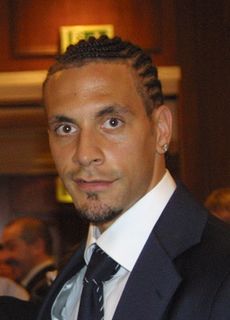
Other early Caribbean footballers included Walter Tull, of Barbadian descent, who played for the north London club Tottenham Hotspur in the early 20th century. Some years later, Jamaican-born Lloyd "Lindy" Delapenha made an impact playing for Middlesbrough between 1950–57, becoming a leading goal scorer and the first Black player to win a championship medal. However, it was not until the 1970s that African-Caribbean players began to make a major impact on the game. Clyde Best (West Ham 1969–1976), born in Bermuda, paved the way for players such as Cyrille Regis (born in French Guyana), and Luther Blissett (born in Jamaica). Blissett and Regis joined Viv Anderson to form the first wave of Black footballers to play for the England national team. Although the number of players of African-Caribbean origin in the English league was increasing far beyond proportions in wider society, when Black players represented the English national team, they still had to endure racism from a section of England supporters. When selected to play for England, Cyril Regis received a bullet through the mail with the threat: "You'll get one of these through your knees if you step on our Wembley turf."
By the 1980s the British African-Caribbean community was well represented at all playing levels of the game. John Barnes, born in Jamaica, was one of the most talented players of his generation and one of the few footballers to win every honour in the domestic English game including the PFA Players' Player of the Year. Although Barnes played for England on 78 occasions between 1983 and 1991, his performances rarely matched his club standard. Subsequently, Barnes identified a culture of racism in football during his era as a player. Players of African-Caribbean origin continued to excel in English football, in the 1990s Paul Ince - whose parents were from Trinidad - went on to captain Manchester United, Liverpool F.C. and the English national team. The contribution was reciprocated when a number of British born footballers including Robbie Earle, Frank Sinclair and Darryl Powell represented the Jamaica national football team in the 1998 World Cup finals.
At the turn of the millennium, British-born Black footballers constituted about 13% of the English league, and a number of groups including "Kick It Out" were highlighting issues of racism still in the game. In the 2006 World Cup finals, Theo Walcott, a striker of English and Jamaican parents, became the youngest ever player to join an England world cup squad - a side that included African-Caribbean players in every department, goal-keeping, defence, midfield and attack. The England football squad for the 2006 world cup also contained Ashley Cole (Barbadian father), Rio Ferdinand (father from St. Lucia) Sol Campbell (Jamaican parents) alongside goalkeeper David James, Jermaine Jenas and Aaron Lennon, all with ancestors from the Caribbean.
Notable contributions
Academia
There are a number of African-Caribbean academics who are especially prominent in the arts and humanities. Professor Paul Gilroy, of Afro-Guyanese and English heritage, is one of Britain's leading academics, having taught sociology at Harvard as well as Goldsmiths College and the London School of Economics. The Jamaican-born cultural theorist Professor Stuart Hall has also been a highly influential British intellectual since the 1960s. Dr. Robert Beckford has presented several national television and radio documentaries exploring African-Caribbean history, culture and religion.
Other prominent academics include Guyanese born Professor Gus John, who has been active in education, schooling and political radicalism in Britain's inner cities such as Manchester, Birmingham and London since the 1960s. He was involved in the organising the "Black people's day of action", a response to the 1981 New Cross Fire. In 1989 he was appointed Director of Education in Hackney and was the first black person to hold such a position. He has also worked as an education consultant in Europe, the Caribbean and Africa. John was the co-ordinator of the Black Parents Movement in Manchester, founded the Education for Liberation book service and helped to organise the International Book Fair of Radical Black and Third World Books in Manchester, London and Bradford. He has worked in a number of University settings, including a visiting Faculty Professor of Education at the University of Strathclyde in Glasgow and is currently an associate professor of the Institute of Education at the University of London. Dr "William" Lez Henry works with young people, particularly black boys. He is the founder of Black Liberation Afrikan Knowledge (BLK Friday) a platform for people to give presentations to the community. In 2005, he received an Excellence in Education Award at the Challenging The Genius: Excellent Education for Children: "Our Future is Not a dream", Conference in Chicago, USA. He is one of the founding members of the National Independent Education Coalition (NIEC). Henry previously hosted a fortnightly talk show on popular London pirate radio station Galaxy 102.5FM (formerly 99.5 FM) or http://www.galaxyafiwe.com/ and who is also a former lecturer of Goldsmiths College. Prof. Harry Goldbourne is a former member of the radical group the Black Unity and Freedom Party who went on to teach at the University of the South Bank.
Acting and entertainment
The 1970s saw the emergence of independent filmmakers such as Trinidadian-born Horace Ové, the director of Pressure, among others. London's Talawa Theatre Company was founded in the 1985 by Jamaican-born Yvonne Brewster, their first production being based on C. L. R. James's historical account of the Haitian Revolution, The Black Jacobins. Since the 1980s, the Blue Mountain Theatre's productions have offered a more earthy style of populist comedy, often bringing over Jamaican artists such as Oliver Samuels.
While Guyanese actor Robert Adams became the first African-Caribbean dramatic actor to appear on British television on 11 May 1938 (in a production of Eugene O'Neill's play The Emperor Jones), African-Caribbean entertainers were first widely popularised on British television broadcasts with the postwar resumption of BBC television in 1946 (pre-war Black entertainers on the BBC – the first in the world – had primarily been African-American stars). The profile of African-Caribbean actors on television, such as Lennie James, Judith Jacob and Diane Parish, has widened substantially since 1970s programmes such as: Love Thy Neighbour (Rudolph Walker) and Rising Damp (Don Warrington) when their role was often to act simply as either the butt of, or foil to, racist jokes made by White characters. The most influential programme in moving away from this formula was the 1989–94 Channel Four barbershop sitcom Desmond's, starring Norman Beaton and Carmen Munroe. In 1982, at the time, the youngest ever actor to play Doctor Who, Peter Davison is of Afro-Guyanese and English descent.
One of the biggest African-Caribbean names in comedy is Lenny Henry, who began his career as a stand-up comedian but whose television sketch shows, where he often caricatured Caribbean émigrés, made him popular enough to headline numerous primetime comedy shows from, for instance, Lenny Henry in 1984 to The Lenny Henry Show in 2004. Becoming a prominent television personality between 2002 and 2009 after appearing on series Big Brother, Jade Goody was of Afro-Jamaican and English descent. Another Big Brother contestant, Alison Hammond, has appeared on many television programmes and in 2020, ITV announced a shake-up of This Morning presenters, with Hammond replacing Eamonn Holmes and Ruth Langsford on a Friday, presenting alongside Dermot O'Leary. Hammond is of Afro-Jamaican descent.
Another big African-Caribbean name is Ainsley Harriott, who has appeared in several shows including Ready Steady Cook, Can't Cook, Won't Cook, City Hospital, Red Dwarf and Strictly Come Dancing. In September 2008, Harriott explored his Caribbean heritage, taking part in the genealogy documentary series, Who Do You Think You Are?.
Other television personalities and presenters include Angellica Bell, Andi Oliver, Alesha Dixon, Josie d’Arby, Diane-Louise Jordan, Floella Benjamin, Margherita Taylor, Trisha Goddard, Shaun Wallace, Mr Motivator, Alex Scott, Marvin and Rochelle Humes.
The highest professional achievement by a British African-Caribbean actor was Marianne Jean-Baptiste's 1996 nominations for an Academy Award (Oscar), Golden Globe and British Academy Award (bafta) for her feature-film debut role in Secrets & Lies. Naomie Harris replicated this in 2017, with nominations for a Golden Globe, BAFTA and Oscar for her performance in Moonlight. Numerous British African-Caribbean actors have become successful in US film and television. In 2009 portraying Lord Voldemort – one of the most famous characters in cinematic history – Frank Dillane has Afro-Jamaican and English heritage. Oxfordshire-born Wentworth Miller of Prison Break fame is also of partial Jamaican descent. Miller earned a Golden Globe Award nomination for his Prison Break role and won a Saturn Award for his guest appearance in the critically acclaimed The Flash. Actor Stephen Graham, who has featured in three Martin Scorsese directed productions, has Afro-Jamaican, Swedish and English ancestry. Delroy Lindo earned a Satellite Award for his role in American docudrama television film Glory & Honor and won numerous accolades for his role as Paul, in Spike Lee's highly praised Da 5 Bloods. Lindo is of Jamaican heritage. Colin Salmon, who is also of Jamaican descent, is known for playing Charles Robinson in three James Bond films and James "One" Shade in the Resident Evil film series. Marsha Thomason, who is of mixed Jamaican and English heritage, has appeared in Disney's The Haunted Mansion, opposite Eddie Murphy, and US television series Las Vegas, Lost and White Collar. Ashley Walters, of Jamaican ancestry, played the role as Antoine in Get Rich or Die Tryin' David Harewood, who is Barbadian descent, played David Estes, Director of the CIA's Counter-terrorism Centre in the highly successful television series Homeland. He also played a lead role in the popular American superhero TV series Supergirl. Harewood was honoured with the Variety Outstanding Achievement Award in recognition of his work and success in both the U.K. and U.S. Lashana Lynch featured opposite Brie Larson in 2019’s Captain Marvel and played the role of Nomi, the secret agent who replaces Craig’s retired Bond in No Time to Die. Lynch won a BAFTA for her role in No Time to Die, thanking her Jamaican parents while accepting the award. Adrian Lester, who is of Jamaican descent, featured in the political blockbuster Primary Colors, directed by Mike Nicholls and co-starring John Travolta, Kathy Bates, Billy Bob Thornton and Emma Thompson. This part earned Lester a Chicago Film Critics Association award nomination for "Most Promising Actor".
Art and design
One of the most influential African-Caribbean people in the British art world has been Prof. Eddie Chambers. Chambers, along with Donald Rodney, Marlene Smith and curator, artist, critic and academic Keith Piper, founded the BLK Art Group in 1982, when they were initially based in the West Midlands. According to Chambers, significant artists such as the Guyanese-born painters Aubrey Williams and Frank Bowling and the Jamaican sculptor Ronald Moody initially found that, despite achieving worldwide renown, it was difficult to find acceptance in the highest echelons of the art establishment. Chambers worked with Donald Rodney and Sonia Boyce, both of whose work is represented in the permanent collections of the London's Tate Britain museum. In 1986 the Hayward Gallery presented the exhibition The Other Story, which provided a survey of African-Caribbean, African and Asian artists working in the UK.
Other African-Caribbean artists of note include Faisal Abdu'allah of Jamaican heritage, Guyanese-born Ingrid Pollard, British-based Jamaican painter Eugene Palmer, the sculptor George "Fowokan" Kelly, and Tam Joseph, whose 1983 work Spirit of Carnival was a vivid depiction of the Notting Hill Carnival. The movement was also part of the impetus that led to the founding of the Association of Black Photographers by Mark Sealy and others. In 1999 the filmmaker Steve McQueen (not to be confused with the Hollywood filmstar) won Britain's most prestigious art prize, the Turner Prize, for his video Deadpan. The artist and producer Pogus Caesar was commissioned by Artangel to direct a film based on McQueen's work. Forward Ever – Backward Never was premiered at the Lumiere in London in 2002. Caesar has also established the OOM Gallery Archives, based in Birmingham, which has in excess of 14,000 images including photographs of contemporary Black British culture.
Music
In 1983, Cleo Laine won the Grammy Award for Best Female Jazz Vocal Performance for Cleo at Carnegie: The 10th Anniversary Concert. Laine has Jamaican heritage. Caribbean Queen scored Billy Ocean two Grammy Award nominations and won him the Best Male R&B Vocal Performance at the 1985 Grammy Awards. Ocean was born in Trinidad but has lived in Sunningdale, Berkshire since 1978. In 1987, Steel Pulse won the Grammy Award for Best Reggae Album, Babylon The Bandit. Original band members (David Hinds, Basil Gabbidon and Ronald McQueen) are all of Jamaican descent. Formed in 1988, Soul II Soul gained significant popularity in the U.S. and achieved two Grammy Awards. Founding member Jazzie B is of Antiguan descent, while lead singer, Caron Wheeler, has Jamaican ancestry. With worldwide record sales of over 70 million, Grammy Award nominated UB40 has various members of Caribbean heritage. With multiple UK number-one achievements between 1999 and 2001, S Club 7 had two members of African-Caribbean heritage. Bradley McIntosh was born to African-Jamaican parents, who had been members of funk group The Cool Notes, and Tina Barrett, who has African-Guyanese and English ancestry. Melanie Brown was an integral part of the 90s girl group The Spice Girls, reportedly the best-selling female group of all time. Brown was born to a father from Saint Kitts and Nevis. Leigh-Anne Pinnock is a member of Little Mix, one of the best-selling girl groups of all time. Pinnock has Barbadian and Jamaican ancestry.
Estelle, who has a Grenadian father, picked up a Grammy Award for Best Rap/Sung Collaboration in 2009. Corinne Bailey Rae, achieved Grammy Awards in 2008 and 2012. Her father is from Saint Kitts and Nevis. Part-Jamaican, Ella Mai, won the Grammy Award for Best R&B Song in 2019. A Mercury Prize and Grammy Awards-nominated artist, rapper Slowthai has Afro-Barbadian, English and Irish ancestry. Nilüfer Yanya has the same background, and also Turkish heritage. Other Grammy nominated British-Caribbean artists include Joan Armatrading, Aswad, Craig David, Eddy Grant, Lianne La Havas, Leona Lewis, Mahalia, Julian Marley, Musical Youth, Nao, Maxi Priest and Jorja Smith.
Sport
British African-Caribbean people are well represented in traditional British sports such as football and rugby, and have also represented the nation at the highest level in sports where Caribbean people typically excel in the home countries such as cricket and athletics. Some British African-Caribbean people have gone on to become international sports stars and top global earners in their chosen sporting field.
Athletics
Britain's first Olympic sprint medals came from Harry Edward, born in Guyana, who won two individual bronze medals at the 1920 games in Antwerp. Many years later, sprinter Linford Christie, born in Saint Andrew Parish, Jamaica, won 23 major championship medals, more than any other British male athlete to date. Christie's career highlight was winning a gold medal in the immensely competitive 100 metres event in the 1992 Barcelona Olympics. Welsh hurdler Colin Jackson, who went to considerable lengths to explore his Jamaican heritage in a BBC documentary, held the 110 metres hurdles world record for 11 years between 1993 and 2004.
Ethel Scott (1907–84) had a Jamaican father and an English mother was the first black woman to represent Great Britain in an international athletics competition. She was a sprinter active in international competitions for a brief period in the 1930s. In general, Scott's achievements are only thinly documented, and she is largely unknown to the British public and historians of sport. Jamaican-born Tessa Sanderson became the first British African-Caribbean woman to win Olympic gold, receiving the medal for her javelin performance in the 1984 Los Angeles Olympics. Denise Lewis, of Jamaican heritage, won heptathlon gold in the 2000 Sydney Olympics, a games where 13 of Britain's 18 track and field representatives had Afro-Caribbean roots. Four years later in the Athens Olympics, Kelly Holmes, the daughter of a Jamaican-born car mechanic, achieved the rare feat of taking gold in both the 800 and 1500 metres races. In the same games, Britain's men's 4 × 100-metre relay team of Marlon Devonish, Darren Campbell, Mark Lewis-Francis and Jason Gardener, all of African-Caribbean heritage, beat the favoured United States quartet to claim Olympic gold. Jessica Ennis-Hill, the daughter of a Jamaican self-employed painter and decorator, won heptathlon gold in the 2012 London Olympics.
Boxing
British boxers of a Caribbean background have played a prominent role in the national boxing scene since the early 1980s. In 1995 Frank Bruno, whose mother was a Pentecostal laypreacher from Jamaica, became Britain's first world heavyweight boxing champion in the 20th century. Bruno's reign was shortly followed by British-born Jamaican Lennox Lewis, who defeated Evander Holyfield and Mike Tyson to become the world's premier heavyweight during the late 1990s. Middleweights Chris Eubank, who spent his early years in Jamaica, and Nigel Benn, of Barbadian descent, both claimed world titles and fought a series of brutal battles in the early 1990s. In the Sydney Olympics of 2000, Audley Harrison (who has Jamaican heritage) became Britain's first heavyweight gold medalist. Other boxing champions from the British African-Caribbean community include the welterweight Lloyd Honeyghan, nicknamed "Ragamuffin Man" by boxing superstar Donald Curry in 1986, in reference to his (in comparison to Curry's extravagance) normal appearance; Honeyghan subsequently spectacularly defeated Curry. James DeGale, who is of Afro-Grenadian and English descent, represented Great Britain at the 2008 Olympics as an amateur, winning a gold medal in the middleweight division. He became the first British boxer in history to win both an Olympic gold medal and a professional world title after landing the IBF super-middleweight crown in April 2015. David Haye, who has English and Jamaican heritage, was the first British boxer to reach the final of the World Amateur Boxing Championships. Haye is one of only three boxers in history to have unified the cruiserweight world titles and become a world heavyweight champion. Jamaican-born Dillian Whyte, has held the WBC interim heavyweight title since March 2021.
Cricket
Cricket has long been a popular pastime among African-Caribbean people in both the West Indies and the United Kingdom, though this has waned somewhat since its peak during the 1960s–1980s. After the period of widespread immigration, tours of England by the combined West Indian cricket team became cultural celebrations of Caribbean culture in Britain, particularly at cricket grounds such as The Oval in South London. Almost all the great West Indian cricketers became regular features of the domestic county game, including Garfield Sobers, Vivian Richards and Michael Holding. In turn, British cricketers of Caribbean origin also began to make an impact in English cricket. In the 1980s–1990s, players including Gladstone Small (born in Barbados), Devon Malcolm (born in Jamaica) and Phillip DeFreitas (born in Dominica) represented England, making significant contributions to the side. Phillip DeFreitas, Devon Malcolm and Gladstone Small made 44, 40 and 17 test match appearances for England respectively. DeFreitas also played 103 One Day Internationals for England. Malcolm made 10 appearances and Small made 53 appearances in the shorter format. Small and DeFreitas also represented England in the final of the 1987 Cricket World Cup against Australia.
Football
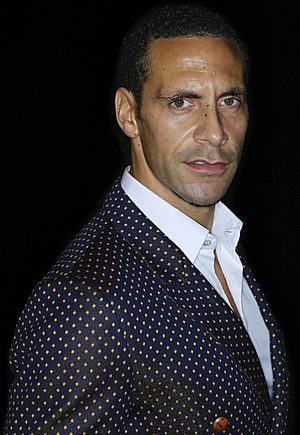
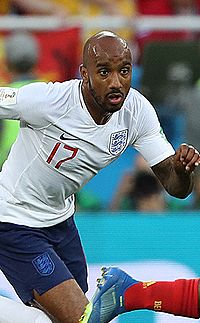
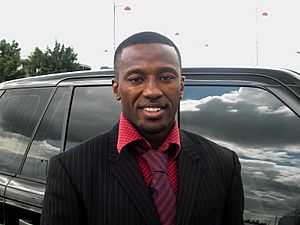
The inaugural West Indian-born footballer to play football at a high level in Britain was Andrew Watson, who played for Queen's Park (Glasgow) and went on to play for Scotland. Born in May 1857 in British Guiana, Watson lived and worked in Scotland and came to be known as one of the best players of his generation. He played in 36 games for Queen's Park and also appeared for the London Swifts in the English FA Cup championship of 1882, making him the first Black player in English Cup history. Watson earned two Scottish Cup medals and four Charity Cup medals during his career; Who's Who also acknowledged his performances in international matches. Watson's place in football history included a spell in management as Club Secretary for Queen's Park – making Watson the first Afro-Caribbean man to reach the boardroom.
Other early Caribbean footballers included Walter Tull, of Barbadian descent, who played for the north London club Tottenham Hotspur in the early 20th century. Some years later, Jamaican-born Lloyd "Lindy" Delapenha made an impact playing for Middlesbrough between 1950 and 1957, becoming a leading goal scorer and the first Black player to win a championship medal. However, it was not until the 1970s that African-Caribbean players began to make a major impact on the game. Clyde Best (West Ham 1969–1976), born in Bermuda, paved the way for players such as Cyrille Regis (born in French Guiana), and Luther Blissett (born in Jamaica). Blissett and Regis joined Viv Anderson to form the first wave of Black footballers to play for the England national team. Although the number of players of African-Caribbean origin in the English league was increasing far beyond proportions in wider society, when Black players represented the English national team, they still had to endure racism attacks at home and abroad. When selected to play for England, Regis received a bullet through the mail with the threat: "You'll get one of these through your knees if you step on our Wembley turf."
By the 1980s the British African-Caribbean community was well represented at all playing levels of the game. John Barnes, born in Jamaica, was one of the most talented players of his generation and one of the few footballers to win every honour in the domestic English game including the PFA Players' Player of the Year. Although Barnes played for England on 78 occasions between 1983 and 1991, his performances rarely matched his club standard. Subsequently, Barnes identified a culture of racism in football during his era as a player. Players of African-Caribbean origin continued to excel in English football, in the 1990s Paul Ince – whose parents were from Trinidad – went on to captain Manchester United, Liverpool F.C. and the English national team. The contribution was reciprocated when a number of British born footballers including Robbie Earle, Frank Sinclair and Darryl Powell represented the Jamaica national football team in the 1998 World Cup finals.
At the turn of the millennium, British-born Black footballers constituted about 13% of the English league, and a number of groups including "Kick It Out" were highlighting issues of racism still in the game. In the 2006 World Cup finals, Theo Walcott, a striker of English and Jamaican parents, became the youngest ever player to join an England world cup squad – a side that included African-Caribbean players in every department, goal-keeping, defence, midfield and attack. The England football squad for the 2006 world cup also contained Ashley Cole (Barbadian father), Rio Ferdinand (father from St. Lucia) Sol Campbell (Jamaican parents) alongside goalkeeper David James, Jermaine Jenas and Aaron Lennon, all with ancestors from the Caribbean. Tyrone Mings, Marcus Rashford, Raheem Sterling and Kyle Walker are some of the British African-Caribbeans who represented England in 2021.
Lewis Hamilton, whose paternal grandparents immigrated from Grenada, won the 2008 Formula One World Championship, in only his second season in the sport; and, after narrowly finishing second in his debut season. He won the Drivers’ Championship again in 2014, 2015, 2017, 2018, 2019 and 2020 becoming the most successful British driver in the history of Formula One. Hamilton is of Afro-Grenadian and English descent.
Rugby league and union
Clive Sullivan, who had both Jamaican and Antiguan heritage, captained the Great Britain team which won the 1972 Rugby League World Cup. Sullivan was the first black captain for a Great Britain team, in any sport. Part of the 2003 Rugby World Cup victory, Jason Robinson was the first African-Caribbean to captain the England rugby union side. He is of Afro-Jamaican and Scottish descent, and his biological son Lewis Tierney has the same background with also English ancestry. Ellery Hanley, who has Jamaican heritage, became the first man to captain his side to three consecutive Challenge Cup victories. Hanley is the only player to win the coveted Man of Steel award on three occasions and is widely considered to be one of the greatest players in rugby league history.
Jimmy Peters, who was of partial Jamaican descent, was the first black man to play rugby union for England. Another England international rugby union player, Danny Cipriani is of Afro-Trinidadian, Italian and English ancestry. Jeremy Guscott, who is of Afro-Jamaican and English descent, played for Bath, England and the British and Irish Lions. Other professional players of Afro-Jamaican heritage include Ashton Golding, Michael Lawrence, Umyla Hanley, Anthony Sullivan, Des Drummond and Ben Jones-Bishop.


